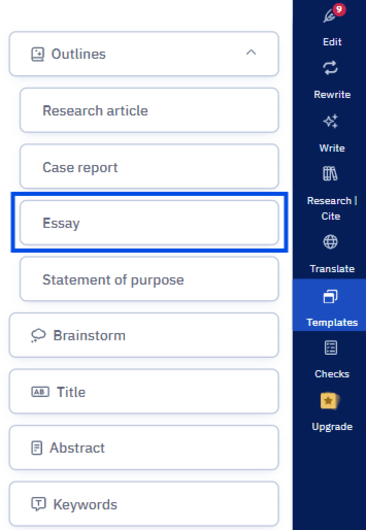

Can You Ask Questions in an Essay?

Many students wonder, “Can you ask questions in an essay?” when they are setting out to write one. As a teacher of IB writing for many years, I know how strong inquiries can be for keeping readers interested, forming an argument, and drawing attention to important ideas.
Using questions in an essay, on the other hand, needs careful planning and placement . Based on my experience, the way you ask one can either support your point of view or take away from it. So, let’s look at some good ways to use questions.
Why Use Questions in Essays?
I believe asking questions in an essay is an excellent way for the reader to stop and think. If you ask a good question at the right time, it makes people think about what you’re talking about instead of quietly taking it in. This method works well because it gives your writing a casual tone that makes it feel like you’re talking directly to the reader.
It’s almost like you’re sitting next to them and directing their thoughts while you talk about your subject. In my experience, this strategy can keep your readers interested from start to finish, especially in IB essays.
So, can you ask a question in an essay? Yes, and when used correctly, it can do amazing things. For example, asking something that makes people curious or pushes their point of view can get them more involved with your case.
Using questions in an Extended Essay can also help readers understand difficult points. From what I’ve seen, especially in IB writing, some subjects can be hard because they have many different parts and shades. Using questions to break up these ideas is a smart way to help the reader follow your thinking. This method works well for academic essays, where clarity is crucial for good communication.

Learn the essentials of crafting a strong claim in an essay and improve the quality of your writing with our expert guidance.
Types of Questions You Can Ask in an Essay
I’ll talk about some of the most powerful types of questions you can ask in an essay and give you examples of how they can make your writing better below.
Rhetorical Questions
Using rhetorical questions, you can make a strong point without expecting an answer. The good thing about these questions is that they gently lead readers to a specific opinion without making them answer.
For example, if you want to stop cutting down trees, you could ask, “Can we afford to lose our forests?” This question emphasizes how serious the problem is and makes people think about the effects of cutting down trees without expecting a straight answer.
Rhetorical questions work well in persuasive essays. They can make your audience think, stress results, or make people feel something.
Hypothetical Questions
Hypothetical questions, often called “what if,” get people to think about different possible futures or scenarios. From what I’ve seen, such queries work best in critical and persuasive essays because they make people think about more than just the particular case.
For example, the question, “What if governments invested more in renewable energy?” makes readers think critically about the subject.
Think about these situations where hypothetical questions could help your writing:
- In policy discussions . “What if everyone, regardless of income, could get health care?”
- To think about what might be possible in science . “What if we found a way to stop climate change?”
- When discussing ethical dilemmas . “What if technology allowed us to change our memories?”
Hypothetical questions are an excellent way to start your essay or guess what might happen.
Open-Ended Questions
Unlike a rhetorical and hypothetical question, an open-ended one doesn’t have a clear answer. Instead, it leaves it up to the reader to decide what they think, making it perfect for essays about big societal problems or philosophy.
If you’re thinking about using an open-ended question, here are some excellent ways to do it:
- To end a strong case or part of writing . Open-ended questions allow readers to think about the topic more deeply.
- To get the person to think about themselves . “What part do we each play in fighting social inequality?”
- For discussing complex societal issues . “How can we balance technological progress with environmental responsibility?”
When you want to leave an impression on people, I think open-ended questions work well in IB essays. They can be used as triggers for reflection, getting people to think about what your point means even after they’re done reading it.
Struggling with formal writing? Our article on words to avoid in an essay provides a complete list of problematic phrases and better alternatives.
Should You Start an Essay With a Question?
Posing a question can be an exciting way to introduce your subject in an essay. Starting with an inquiry gets people’s attention and makes the tone more casual.
But can you start an essay with a question every time? Not all the time. From what I’ve seen, this method works best when directly related to a complex subject . But if you use this method too often, it might make your opening feel like a formula.
A good starting question can interest people, which makes them want to keep reading. If your essay is about climate change, for example, starting with “Is our planet in danger?” can get people to think deeply about the subject.
On the other hand, a question that is too general could make your opening less strong. So, if you’re considering starting an essay with a question, choose one that adds value.
How to Introduce a Question in an Essay?
I’ve compiled a list of the best ways to introduce a question in an essay. Each can help you get your point across without getting in the way of the flow of your writing.
1. Make Transitions
You can make your essay move smoothly by using questions to connect different parts or points. Say you’ve given one point of view and now want to make a counterargument .
A question like, “But what if there’s another side to this issue?” can help the change feel natural. This method makes it easy for readers to move from one point to the next, which keeps your case flowing.
2. Place an Emphasis
Questions meant to make you think, like rhetorical or reflective questions, don’t need an answer. This method works exceptionally well in critical and persuasive writings where you want people to stop and think about your point of view.
For instance, “Is economic growth worth giving up environmental protection?” People who read this question should consider economic strategies’ moral and social aspects without expecting a solution.
3. Research Different Scenarios
Hypothetical questions, also known as “what if” questions, get people to think about what might happen or what could happen in the future. This method works great for subjects whose results are unclear or could be different.
When talking about artificial intelligence, for instance, you could start with a question like, “What if AI surpasses human intelligence?” This question makes people think about what might happen in the future, which gives your research more meaning.
4. Encourage Reflection
You might want to end a part with an open-ended question sometimes, especially if the topic of your essay is psychological or moral. These prompts get people to think more deeply about what they’ve read or come to their conclusions.
For example, in an essay about global inequality, ending a section with “How should we, as a global community, deal with these differences?” makes the reader consider the bigger picture.
Don’t let the stress of the IB curriculum hold you back.
Are you having trouble coming up with topic suggestions for your IB Extended Essay? Or do you need help with Internal Assessment?
Our experienced writers can help you choose the perfect topic and assist you with any assignment.
You can order an Extended Essay tailored to your specific subject and requirements.
Our experienced IB writers are always ready to help.
Simply click:

How to Ask a Question in an Essay?
An appropriately used question can present a new idea, stress a point, or direct the reader’s thoughts in a certain way. But how do you ask a good question in an essay? From what I’ve seen, there are a few things you can do to make sure your query adds to your case instead of taking away from it.
First, ensure your question is related to the subject and helps your main point. An excellent query can help you organize your thoughts and direct the reader’s attention to the most critical parts of your essay.
Some ways to ask questions in an essay are listed below:
- To make a strong point, use rhetorical questions. Like, “Can we ignore the effects of climate change?”
- Ask “what if” questions, like “What if everyone cut down on their carbon footprint?” to look into different possible outcomes.
- Ask people open-ended questions like, “What role will we play in solving this issue?” to get them to think.
Last, make sure your question is short and clear. Don’t ask questions that are too hard to understand or unclear. In my view, a well-placed question keeps your essay interesting and shows that you can carefully guide the reader through your case. Using this method correctly can give your writing more meaning and keep people interested in what you have to say.

Final Thoughts
So, can you ask questions in an essay? Of course! When used carefully, questions can give your writing more meaning, clarity, and mystery. They’re great for adding new ideas, making cases more potent, and breaking down complex concepts into simpler ones that are easier to understand. However, they work best when used in balance and with a clear goal, just like any other good writing tool.
If you need professionally written essays that are 100% original, IBWritingService.com can help. Our experienced IB writers start from scratch on every assignment, so you can be sure you’ll get the best work every time.
Get hot offers and discounts for your IB Assignments
Our writing solutions cater to all disciplines within the IB program, and we specialize in crafting academic papers for students of all levels. We follow the IB criteria.
Adhering strictly to the rigorous standards set by the IB, we deploy a methodical approach to our writing process. This ensures that every piece of content we generate not only meets but exceeds the expectations set within the program.
Contact us:
Latest Articles:

Words to Avoid in an Essay. List With Explanations

What Is a Claim in an Essay?

Our services:
- Buy Internal Assessment
- Buy Math IA
- Buy Extended Essay
- Buy TOK Essay
- Buy TOK Exhibition
IBWritingService.com is an independent academic writing aid with no official ties to the International Baccalaureate Organization (IBO). Our use of “IB” in the domain and title is purely for identification, and we neither claim nor imply any endorsement or partnership with the IBO. Our services aim to support students’ educational needs without violating IBO policies. Trademarks mentioned are property of their owners and do not suggest affiliations. By using our services, you acknowledge our non-affiliation with the IBO and that we’re not a substitute for IBO requirements. We deny any liability for use of our services in relation to the IBO.
ALL PAPERS WRITTEN BY OUR EXPERTS AS PART OF THIS WRITING SERVICE ARE FOR REFERENCE PURPOSES ONLY. WHEN USING CONTENT PURCHASED FROM THIS WEBSITE, IT MUST BE PROPERLY REFERENCED.
- Terms & Conditions
- Revision Policy
- Privacy Policy
- Refund Policy
- Cookie Policy
© 2024. All Rights Reserved.

How to Write an Essay Introduction (with Examples)

The introduction of an essay plays a critical role in engaging the reader and providing contextual information about the topic. It sets the stage for the rest of the essay, establishes the tone and style, and motivates the reader to continue reading.
Table of Contents
What is an essay introduction , what to include in an essay introduction, how to create an essay structure , step-by-step process for writing an essay introduction , how to write an essay introduction paragraph with paperpal – step -by -step, how to write a hook for your essay , how to include background information , how to write a thesis statement .
- Argumentative Essay Introduction Example:
- Expository Essay Introduction Example
Literary Analysis Essay Introduction Example
Check and revise – checklist for essay introduction , key takeaways , frequently asked questions .
An introduction is the opening section of an essay, paper, or other written work. It introduces the topic and provides background information, context, and an overview of what the reader can expect from the rest of the work. 1 The key is to be concise and to the point, providing enough information to engage the reader without delving into excessive detail.
The essay introduction is crucial as it sets the tone for the entire piece and provides the reader with a roadmap of what to expect. Here are key elements to include in your essay introduction:
- Hook : Start with an attention-grabbing statement or question to engage the reader. This could be a surprising fact, a relevant quote, or a compelling anecdote.
- Background information : Provide context and background information to help the reader understand the topic. This can include historical information, definitions of key terms, or an overview of the current state of affairs related to your topic.
- Thesis statement : Clearly state your main argument or position on the topic. Your thesis should be concise and specific, providing a clear direction for your essay.
Before we get into how to write an essay introduction, we need to know how it is structured. The structure of an essay is crucial for organizing your thoughts and presenting them clearly and logically. It is divided as follows: 2
- Introduction: The introduction should grab the reader’s attention with a hook, provide context, and include a thesis statement that presents the main argument or purpose of the essay.
- Body: The body should consist of focused paragraphs that support your thesis statement using evidence and analysis. Each paragraph should concentrate on a single central idea or argument and provide evidence, examples, or analysis to back it up.
- Conclusion: The conclusion should summarize the main points and restate the thesis differently. End with a final statement that leaves a lasting impression on the reader. Avoid new information or arguments.

Here’s a step-by-step guide on how to write an essay introduction:
- Start with a Hook : Begin your introduction paragraph with an attention-grabbing statement, question, quote, or anecdote related to your topic. The hook should pique the reader’s interest and encourage them to continue reading.
- Provide Background Information : This helps the reader understand the relevance and importance of the topic.
- State Your Thesis Statement : The last sentence is the main argument or point of your essay. It should be clear, concise, and directly address the topic of your essay.
- Preview the Main Points : This gives the reader an idea of what to expect and how you will support your thesis.
- Keep it Concise and Clear : Avoid going into too much detail or including information not directly relevant to your topic.
- Revise : Revise your introduction after you’ve written the rest of your essay to ensure it aligns with your final argument.
Unsure of how to start your essay introduction? Leverage Paperpal’s Generative AI templates to provide a base for your essay introduction. Here’s an example of an essay outline generated by Paperpal.

Use Paperpal’s Preditive AI writing features to maintain your writing flow
This is one of the key steps in how to write an essay introduction. Crafting a compelling hook is vital because it sets the tone for your entire essay and determines whether your readers will stay interested. A good hook draws the reader in and sets the stage for the rest of your essay.
- Avoid Dry Fact : Instead of simply stating a bland fact, try to make it engaging and relevant to your topic. For example, if you’re writing about the benefits of exercise, you could start with a startling statistic like, “Did you know that regular exercise can increase your lifespan by up to seven years?”
- Avoid Using a Dictionary Definition : While definitions can be informative, they’re not always the most captivating way to start an essay. Instead, try to use a quote, anecdote, or provocative question to pique the reader’s interest. For instance, if you’re writing about freedom, you could begin with a quote from a famous freedom fighter or philosopher.
- Do Not Just State a Fact That the Reader Already Knows : This ties back to the first point—your hook should surprise or intrigue the reader. For Here’s an introduction paragraph example, if you’re writing about climate change, you could start with a thought-provoking statement like, “Despite overwhelming evidence, many people still refuse to believe in the reality of climate change.”
Write essays 2x faster with Paperpal. Try for free
Including background information in the introduction section of your essay is important to provide context and establish the relevance of your topic. When writing the background information, you can follow these steps:
- Start with a General Statement: Begin with a general statement about the topic and gradually narrow it down to your specific focus. For example, when discussing the impact of social media, you can begin by making a broad statement about social media and its widespread use in today’s society, as follows: “Social media has become an integral part of modern life, with billions of users worldwide.”
- Define Key Terms : Define any key terms or concepts that may be unfamiliar to your readers but are essential for understanding your argument.
- Provide Relevant Statistics: Use statistics or facts to highlight the significance of the issue you’re discussing. For instance, “According to a report by Statista, the number of social media users is expected to reach 4.41 billion by 2025.”
- Discuss the Evolution: Mention previous research or studies that have been conducted on the topic, especially those that are relevant to your argument. Mention key milestones or developments that have shaped its current impact. You can also outline some of the major effects of social media. For example, you can briefly describe how social media has evolved, including positives such as increased connectivity and issues like cyberbullying and privacy concerns.
- Transition to Your Thesis: Use the background information to lead into your thesis statement, which should clearly state the main argument or purpose of your essay. For example, “Given its pervasive influence, it is crucial to examine the impact of social media on mental health.”

A thesis statement is a concise summary of the main point or claim of an essay, research paper, or other type of academic writing. It appears near the end of the introduction. Here’s how to write a thesis statement:
- Identify the topic: Start by identifying the topic of your essay. For example, if your essay is about the importance of exercise for overall health, your topic is “exercise.”
- State your position: Next, state your position or claim about the topic. This is the main argument or point you want to make. For example, if you believe that regular exercise is crucial for maintaining good health, your position could be: “Regular exercise is essential for maintaining good health.”
- Support your position: Provide a brief overview of the reasons or evidence that support your position. These will be the main points of your essay. For example, if you’re writing an essay about the importance of exercise, you could mention the physical health benefits, mental health benefits, and the role of exercise in disease prevention.
- Make it specific: Ensure your thesis statement clearly states what you will discuss in your essay. For example, instead of saying, “Exercise is good for you,” you could say, “Regular exercise, including cardiovascular and strength training, can improve overall health and reduce the risk of chronic diseases.”
Examples of essay introduction
Here are examples of essay introductions for different types of essays:
Argumentative Essay Introduction Example:
Topic: Should the voting age be lowered to 16?
“The question of whether the voting age should be lowered to 16 has sparked nationwide debate. While some argue that 16-year-olds lack the requisite maturity and knowledge to make informed decisions, others argue that doing so would imbue young people with agency and give them a voice in shaping their future.”
Expository Essay Introduction Example
Topic: The benefits of regular exercise
“In today’s fast-paced world, the importance of regular exercise cannot be overstated. From improving physical health to boosting mental well-being, the benefits of exercise are numerous and far-reaching. This essay will examine the various advantages of regular exercise and provide tips on incorporating it into your daily routine.”
Text: “To Kill a Mockingbird” by Harper Lee
“Harper Lee’s novel, ‘To Kill a Mockingbird,’ is a timeless classic that explores themes of racism, injustice, and morality in the American South. Through the eyes of young Scout Finch, the reader is taken on a journey that challenges societal norms and forces characters to confront their prejudices. This essay will analyze the novel’s use of symbolism, character development, and narrative structure to uncover its deeper meaning and relevance to contemporary society.”
- Engaging and Relevant First Sentence : The opening sentence captures the reader’s attention and relates directly to the topic.
- Background Information : Enough background information is introduced to provide context for the thesis statement.
- Definition of Important Terms : Key terms or concepts that might be unfamiliar to the audience or are central to the argument are defined.
- Clear Thesis Statement : The thesis statement presents the main point or argument of the essay.
- Relevance to Main Body : Everything in the introduction directly relates to and sets up the discussion in the main body of the essay.
Write strong essays in academic English with Paperpal. Try it for free
Writing a strong introduction is crucial for setting the tone and context of your essay. Here are the key takeaways for how to write essay introduction: 3
- Hook the Reader : Start with an engaging hook to grab the reader’s attention. This could be a compelling question, a surprising fact, a relevant quote, or an anecdote.
- Provide Background : Give a brief overview of the topic, setting the context and stage for the discussion.
- Thesis Statement : State your thesis, which is the main argument or point of your essay. It should be concise, clear, and specific.
- Preview the Structure : Outline the main points or arguments to help the reader understand the organization of your essay.
- Keep it Concise : Avoid including unnecessary details or information not directly related to your thesis.
- Revise and Edit : Revise your introduction to ensure clarity, coherence, and relevance. Check for grammar and spelling errors.
- Seek Feedback : Get feedback from peers or instructors to improve your introduction further.
The purpose of an essay introduction is to give an overview of the topic, context, and main ideas of the essay. It is meant to engage the reader, establish the tone for the rest of the essay, and introduce the thesis statement or central argument.
An essay introduction typically ranges from 5-10% of the total word count. For example, in a 1,000-word essay, the introduction would be roughly 50-100 words. However, the length can vary depending on the complexity of the topic and the overall length of the essay.
An essay introduction is critical in engaging the reader and providing contextual information about the topic. To ensure its effectiveness, consider incorporating these key elements: a compelling hook, background information, a clear thesis statement, an outline of the essay’s scope, a smooth transition to the body, and optional signposting sentences.
The process of writing an essay introduction is not necessarily straightforward, but there are several strategies that can be employed to achieve this end. When experiencing difficulty initiating the process, consider the following techniques: begin with an anecdote, a quotation, an image, a question, or a startling fact to pique the reader’s interest. It may also be helpful to consider the five W’s of journalism: who, what, when, where, why, and how. For instance, an anecdotal opening could be structured as follows: “As I ascended the stage, momentarily blinded by the intense lights, I could sense the weight of a hundred eyes upon me, anticipating my next move. The topic of discussion was climate change, a subject I was passionate about, and it was my first public speaking event. Little did I know , that pivotal moment would not only alter my perspective but also chart my life’s course.”
Crafting a compelling thesis statement for your introduction paragraph is crucial to grab your reader’s attention. To achieve this, avoid using overused phrases such as “In this paper, I will write about” or “I will focus on” as they lack originality. Instead, strive to engage your reader by substantiating your stance or proposition with a “so what” clause. While writing your thesis statement, aim to be precise, succinct, and clear in conveying your main argument.
To create an effective essay introduction, ensure it is clear, engaging, relevant, and contains a concise thesis statement. It should transition smoothly into the essay and be long enough to cover necessary points but not become overwhelming. Seek feedback from peers or instructors to assess its effectiveness.
References
- Cui, L. (2022). Unit 6 Essay Introduction. Building Academic Writing Skills .
- West, H., Malcolm, G., Keywood, S., & Hill, J. (2019). Writing a successful essay. Journal of Geography in Higher Education , 43 (4), 609-617.
- Beavers, M. E., Thoune, D. L., & McBeth, M. (2023). Bibliographic Essay: Reading, Researching, Teaching, and Writing with Hooks: A Queer Literacy Sponsorship. College English, 85(3), 230-242.
Paperpal is a comprehensive AI writing toolkit that helps students and researchers achieve 2x the writing in half the time. It leverages 21+ years of STM experience and insights from millions of research articles to provide in-depth academic writing, language editing, and submission readiness support to help you write better, faster.
Get accurate academic translations, rewriting support, grammar checks, vocabulary suggestions, and generative AI assistance that delivers human precision at machine speed. Try for free or upgrade to Paperpal Prime starting at US$19 a month to access premium features, including consistency, plagiarism, and 30+ submission readiness checks to help you succeed.
Experience the future of academic writing – Sign up to Paperpal and start writing for free!
Related Reads:
- How to Write a Good Hook for Essays, with Examples
- What is an Argumentative Essay? How to Write It (With Examples)
- How Long Should a Chapter Be?
- How to Use Paperpal to Generate Emails & Cover Letters?
Similarity Checks: The Author’s Guide to Plagiarism and Responsible Writing
Types of plagiarism and 6 tips to avoid it in your writing , you may also like, what is the purpose of an abstract why..., what are citation styles which citation style to..., what are the types of literature reviews , abstract vs introduction: what is the difference , mla format: guidelines, template and examples , machine translation vs human translation: which is reliable..., dissertation printing and binding | types & comparison , what is a dissertation preface definition and examples , how to write a research proposal: (with examples..., how to write your research paper in apa....

IMAGES
VIDEO